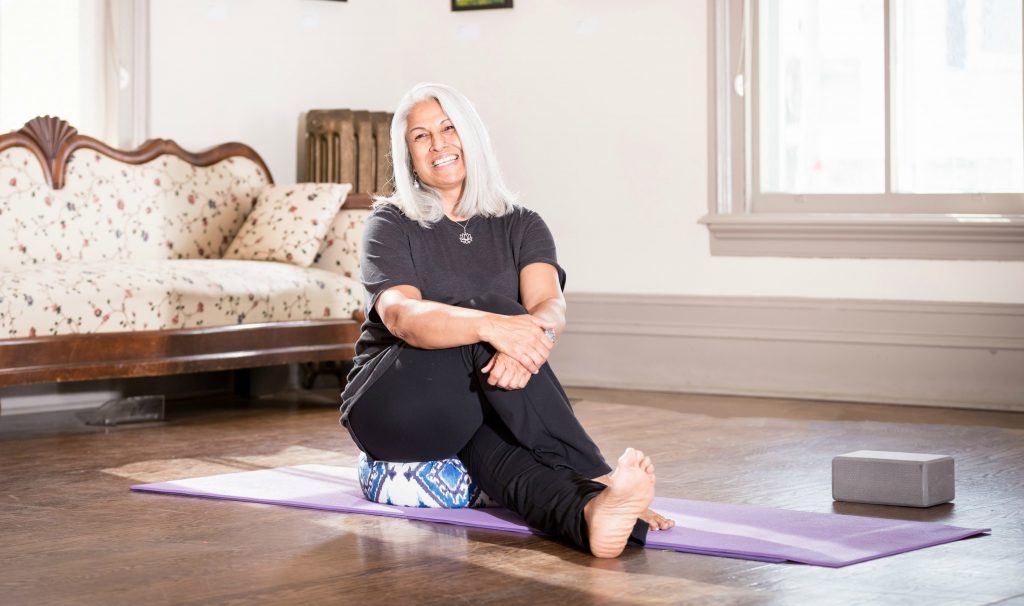It’s all about balance, resilience — and the occasional reality check

Balance and resilience are at the heart of everything professor Anju Joshi does, from teaching gerontology to practising Integrative Yoga Therapy. Photo by: Sarah Janes.
BY Sonia Verma
March 27, 2018
Don’t ever tell Anju Joshi she can’t do something. Because she will prove you wrong with crushing ruthlessness —and a smile on her face.
“Years before I had knee surgery, a physiotherapist said to me, ‘You can’t do yoga with those knees,’ ” the gerontology professor says with a big smile, rolling up a purple yoga mat. She’s just finished leading a 90-minute yoga class — one of two she teaches every week. “I became a yoga instructor because of her.”
When she was 21, Joshi applied for graduate school after her brother scoffed at her, saying she’d never do it. “He was so sure, he said he’d pay my tuition if I made it,” she remembers.
Two years later, Joshi had a master’s degree in health economics and her brother had some new financial obligations.
Right after that, when she got a job with P.E.I.’s department of Health and Social Service, developing services for older adults, people used to say to her, “You’re only 23 — what do you know about aging?” So she went back to school to study gerontology — this time at the University of Florida.
And when her family moved to Hamilton, Joshi got a secretarial job at McMaster’s gerontology office. After she’d been there a while, Professor Karl Kinanen asked Joshi to talk to his class about the economics of aging. “It took me 50 hours to prepare that one lecture,” she remembers. “I had no experience or interest in teaching, but if you give me a challenge …”
The next year she taught half a course. Then a full course. Eventually, she made the transition from staff to full-time faculty.
Joshi, who recently received the YWCA Hamilton’s Women of Distinction Lifetime Achievement award, has been at McMaster for 33 years. She was actively involved in helping Mac’s gerontology program grow (it ultimately merged with Health Studies to form the department of Health, Aging and Society). She co-founded the Hamilton Council on Aging, coordinated a summer institute that engaged hundreds of members of the community over two decades, produced a seminal video on aging and personhood and taught the McMaster Discovery Program, a free university-level course for adults in the community who face barriers to education.
Joshi is on the board of the Hamilton Community Foundation and works with the McMaster Institute of Research on Aging and the Gilbrea Centre for Studies in Aging — both of which exist because of McMaster’s rising reputation as a centre for aging research. She also travels to Alberta and Saskatchewan to train front-line case workers.
But most importantly to Joshi, she is a teacher. Her gerontology classes are meant to challenge students, she says, “and I insist on experiential learning.” Her students visit long-term care centres and retirement homes, and about two dozen older adults come to campus every week to discuss their lives with small groups of first-year students
“It’s a reality check for students,” Joshi says. “They need to talk to older people to hear and understand how they experience aging. It’s not just memorizing words in a book.”
Some of those people have been coming to meet Joshi’s students for upward of 15 years. “Both terms, once a week, these people have been coming on campus, solely to promote learning,” she says.
“We are so lucky.”
Over the years, hundreds of Joshi’s students have come to the realization that these older adults are individuals with diverse lives and interests, “not a giant mass of silver-haired people who are suddenly all the same.”
While Joshi dislikes broad generalizations of aging — “Don’t even talk to me about this ‘Silver tsunami’ garbage,” she says, rolling her eyes — the flip side is not looking through too narrow a lens.
“You need to look at how aging affects health, economics, psychology, physiology, social life, etc. … all of it,” Joshi says. “Gerontology needs to be interdisciplinary. And it’s only when you examine all aspects, and more importantly, talk to people about their experiences of aging, that you understand how to make it a more positive, better experience.”
That is at the heart of Joshi’s work — making aging a more positive experience. “ I love to share stories about personhood, so we can honour people ,” she says. “Older people are still people. They still want to be themselves.”
Not enough people listen to what older adults have to say, she says. “My mission is to disseminate knowledge about aging, learn from the community, and bring what we learn back to students,” she says. “It’s the most important part of my job.”
Now, after 33 years of doing that job, Joshi is talking about retiring. But she won’t be leaving. Instead, she plans on turning her attention to undergraduate students and their mental health.
More than ever, Joshi says, students today need help with anxiety and mental wellness. Balance and resilience are key to everything Joshi teaches, and she wants to help students work on both.


